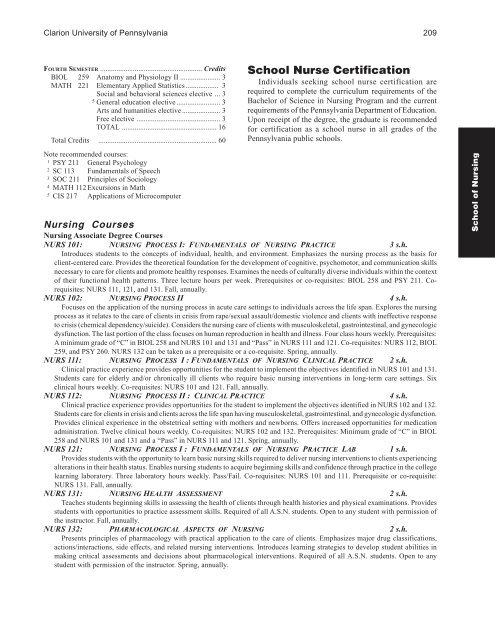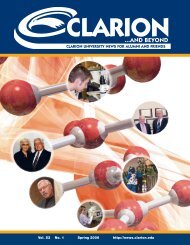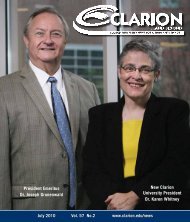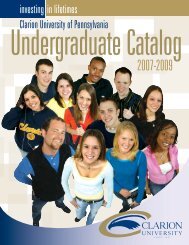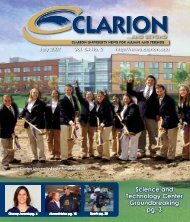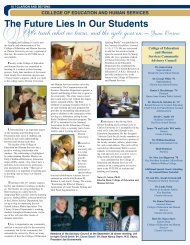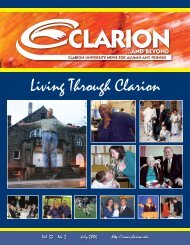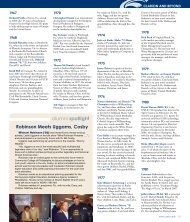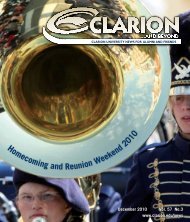Undergraduate - Clarion University
Undergraduate - Clarion University
Undergraduate - Clarion University
You also want an ePaper? Increase the reach of your titles
YUMPU automatically turns print PDFs into web optimized ePapers that Google loves.
<strong>Clarion</strong> <strong>University</strong> of Pennsylvania 209<br />
FOURTH SEMESTER ........................................................ Credits<br />
BIOL 259 Anatomy and Physiology II ...................... 3<br />
MATH 221 Elementary Applied Statistics .................. 3<br />
Social and behavioral sciences elective ... 3<br />
5 General education elective ........................ 3<br />
Arts and humanities elective..................... 3<br />
Free elective .............................................. 3<br />
TOTAL .................................................... 16<br />
Total Credits ................................................................. 60<br />
Note recommended courses:<br />
1<br />
PSY 211 General Psychology<br />
2<br />
SC 113 Fundamentals of Speech<br />
3<br />
SOC 211 Principles of Sociology<br />
4<br />
MATH 112 Excursions in Math<br />
5<br />
CIS 217 Applications of Microcomputer<br />
School Nurse Certification<br />
Individuals seeking school nurse certification are<br />
required to complete the curriculum requirements of the<br />
Bachelor of Science in Nursing Program and the current<br />
requirements of the Pennsylvania Department of Education.<br />
Upon receipt of the degree, the graduate is recommended<br />
for certification as a school nurse in all grades of the<br />
Pennsylvania public schools.<br />
Nursing Courses<br />
Nursing Associate Degree Courses<br />
NURS 101: NURSING PROCESS I: FUNDAMENTALS OF NURSING PRACTICE 3 s.h.<br />
Introduces students to the concepts of individual, health, and environment. Emphasizes the nursing process as the basis for<br />
client-centered care. Provides the theoretical foundation for the development of cognitive, psychomotor, and communication skills<br />
necessary to care for clients and promote healthy responses. Examines the needs of culturally diverse individuals within the context<br />
of their functional health patterns. Three lecture hours per week. Prerequisites or co-requisites: BIOL 258 and PSY 211. Corequisites:<br />
NURS 111, 121, and 131. Fall, annually.<br />
NURS 102: NURSING PROCESS II 4 s.h.<br />
Focuses on the application of the nursing process in acute care settings to individuals across the life span. Explores the nursing<br />
process as it relates to the care of clients in crisis from rape/sexual assault/domestic violence and clients with ineffective response<br />
to crisis (chemical dependency/suicide). Considers the nursing care of clients with musculoskeletal, gastrointestinal, and gynecologic<br />
dysfunction. The last portion of the class focuses on human reproduction in health and illness. Four class hours weekly. Prerequisites:<br />
A minimum grade of “C” in BIOL 258 and NURS 101 and 131 and “Pass” in NURS 111 and 121. Co-requisites: NURS 112, BIOL<br />
259, and PSY 260. NURS 132 can be taken as a prerequisite or a co-requisite. Spring, annually.<br />
NURS 111: NURSING PROCESS I : FUNDAMENTALS OF NURSING CLINICAL PRACTICE 2 s.h.<br />
Clinical practice experience provides opportunities for the student to implement the objectives identified in NURS 101 and 131.<br />
Students care for elderly and/or chronically ill clients who require basic nursing interventions in long-term care settings. Six<br />
clinical hours weekly. Co-requisites: NURS 101 and 121. Fall, annually.<br />
NURS 112: NURSING PROCESS II : CLINICAL PRACTICE 4 s.h.<br />
Clinical practice experience provides opportunities for the student to implement the objectives identified in NURS 102 and 132.<br />
Students care for clients in crisis and clients across the life span having musculoskeletal, gastrointestinal, and gynecologic dysfunction.<br />
Provides clinical experience in the obstetrical setting with mothers and newborns. Offers increased opportunities for medication<br />
administration. Twelve clinical hours weekly. Co-requisites: NURS 102 and 132. Prerequisites: Minimum grade of “C” in BIOL<br />
258 and NURS 101 and 131 and a “Pass” in NURS 111 and 121. Spring, annually.<br />
NURS 121: NURSING PROCESS I : FUNDAMENTALS OF NURSING PRACTICE LAB 1 s.h.<br />
Provides students with the opportunity to learn basic nursing skills required to deliver nursing interventions to clients experiencing<br />
alterations in their health status. Enables nursing students to acquire beginning skills and confidence through practice in the college<br />
learning laboratory. Three laboratory hours weekly. Pass/Fail. Co-requisites: NURS 101 and 111. Prerequisite or co-requisite:<br />
NURS 131. Fall, annually.<br />
NURS 131: NURSING HEALTH ASSESSMENT 2 s.h.<br />
Teaches students beginning skills in assessing the health of clients through health histories and physical examinations. Provides<br />
students with opportunities to practice assessment skills. Required of all A.S.N. students. Open to any student with permission of<br />
the instructor. Fall, annually.<br />
NURS 132: PHARMACOLOGICAL ASPECTS OF NURSING 2 s.h.<br />
Presents principles of pharmacology with practical application to the care of clients. Emphasizes major drug classifications,<br />
actions/interactions, side effects, and related nursing interventions. Introduces learning strategies to develop student abilities in<br />
making critical assessments and decisions about pharmacological interventions. Required of all A.S.N. students. Open to any<br />
student with permission of the instructor. Spring, annually.<br />
School of Nursing


